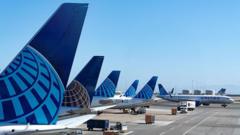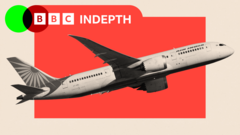The Trump administration moved forward with an investigation regarding the import of commercial jets, jet engines, and related components on May 1, potentially paving the way for new tariffs. The inquiry, directed by Commerce Secretary Howard Lutnick, utilizes the Trade Expansion Act, granting the president authority to impose tariffs for national security reasons. This follows a series of tariffs already established by the Trump administration on steel, aluminum, and recent inquiries into vital sectors like semiconductors and pharmaceuticals.
In this fresh investigation, the Commerce Department seeks industry feedback regarding domestic demand for aircraft and the potential for fulfilling that need locally, as well as examining the role of foreign suppliers and any government favoritism. While tariffs could be positioned as a protective measure, concerns surface regarding their potential adverse effects on the aerospace industry that heavily depends on a global supply chain.
With predictions estimating aerospace exports to reach $125 billion this year, the sector has consistently provided robust trade surpluses. Eric Fanning, president of the Aerospace Industries Association, emphasized the industry’s significant contributions to the economy, advocating for a balanced approach that strengthens domestic supply chains without undermining international trade frameworks.
Boeing, a key player in commercial aviation, reported that the direct impact of existing tariffs had been minimal based on their operations, although they voiced fears about the potential repercussions on their supply network. In contrast, companies like RTX and GE Aerospace have estimated higher costs linked to tariffs, indicating a combined financial impact exceeding $1 billion this year.
Historically, countries have imposed tariffs and provided subsidies to bolster their aviation sectors. Ongoing disputes between the United States and the European Union over alleged subsidies to Boeing and Airbus, the largest manufacturers in the industry, exemplify the competitive complexities present in global aviation. However, a resolution in 2021 concluded a 17-year-long conflict, focusing both parties on countering China’s growing influence in major industries.
Niraj Chokshi covers the aviation sector and related transport industries, shedding light on the implications of these investigations and potential tariffs on both domestic and international markets.
In this fresh investigation, the Commerce Department seeks industry feedback regarding domestic demand for aircraft and the potential for fulfilling that need locally, as well as examining the role of foreign suppliers and any government favoritism. While tariffs could be positioned as a protective measure, concerns surface regarding their potential adverse effects on the aerospace industry that heavily depends on a global supply chain.
With predictions estimating aerospace exports to reach $125 billion this year, the sector has consistently provided robust trade surpluses. Eric Fanning, president of the Aerospace Industries Association, emphasized the industry’s significant contributions to the economy, advocating for a balanced approach that strengthens domestic supply chains without undermining international trade frameworks.
Boeing, a key player in commercial aviation, reported that the direct impact of existing tariffs had been minimal based on their operations, although they voiced fears about the potential repercussions on their supply network. In contrast, companies like RTX and GE Aerospace have estimated higher costs linked to tariffs, indicating a combined financial impact exceeding $1 billion this year.
Historically, countries have imposed tariffs and provided subsidies to bolster their aviation sectors. Ongoing disputes between the United States and the European Union over alleged subsidies to Boeing and Airbus, the largest manufacturers in the industry, exemplify the competitive complexities present in global aviation. However, a resolution in 2021 concluded a 17-year-long conflict, focusing both parties on countering China’s growing influence in major industries.
Niraj Chokshi covers the aviation sector and related transport industries, shedding light on the implications of these investigations and potential tariffs on both domestic and international markets.























